Shelf Life #11
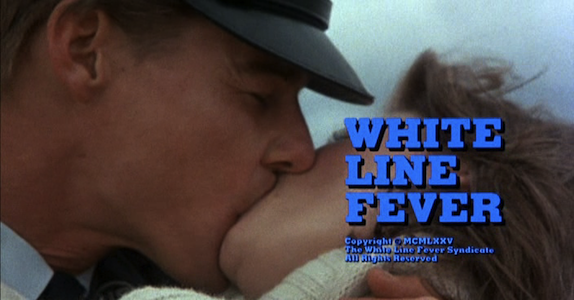
Aaron has dug out another batch of little-known films in his blog, running the gamut from sci-fi horror to incest shocker to truck driving. Pretty much the same scope as the Academy Awards, really… Read on and be enticed into tracking these titles down for yourself – or, depending on your tastes, running as far away from them as possible.
EMBRYO

I first came across Ralph Nelson’s sci-fi-horror shocker Embryo (1976) on a public domain DVD some years ago but my memories of the movie were quite foggy ‘cos the transfer looked no better than a fourth-gen VHS copy. In 2009, it surfaced again on DVD, in France of all places, and though it’s not a release that will probably excite HD buffs (the English audio goes out of sync at numerous points), I think this edition remains the most watchable to date until a scrubbed-up Blu-ray release comes along (unlikely, but stranger things have happened).
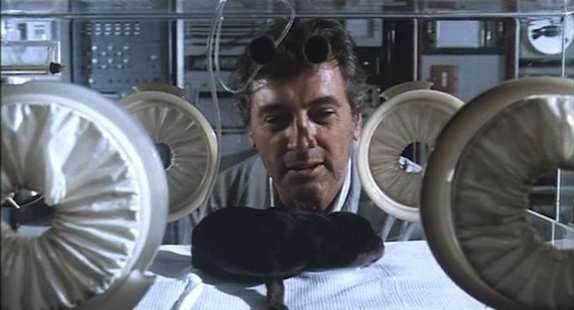
Embryo combines two things I have a particular — peculiar perhaps — fondness for: respectable veteran actors/directors slumming it in trashy B-movie material, and twisted PG-rated genre pics from the ’70s that make you question how in the world it ever got that rating. To put Embryo in perspective: today you’d never see a PG-rated movie that features the corpse of a prostitute with her foetus ripped out. The tone of the whole film is just plain wrong.
For Nelson, who in the past has done racially conscious work like 1963 Best Picture Oscar nominee Lilies of the Field and the controversial western Soldier Blue, to forward-thinking sci-fi dramas like Charly, Embryo is easily the schlockiest, most exploitative thing he’s ever made, funneling the abortion politics of the time through cheap, Frankenstein horror-show theatrics that barely probe the ethical conundrums posed by its playing-God narrative.
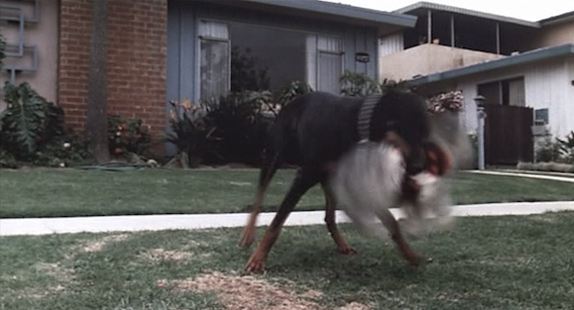
A past-prime Rock Hudson is glum widower Dr. Paul Holliston, whose experiments in rapid hormone growth pays off when he accidentally runs over a pregnant doberman. Discovering that his “placental lactogen” can turn a dog foetus into a full grown canine in a matter of days, he decides to sneakily try it on a human specimen, and soon has exotic one-time Bond girl Barbara Carrera (Never Say Never Again) walking around naked in his house, learning math and wanting to bang him.
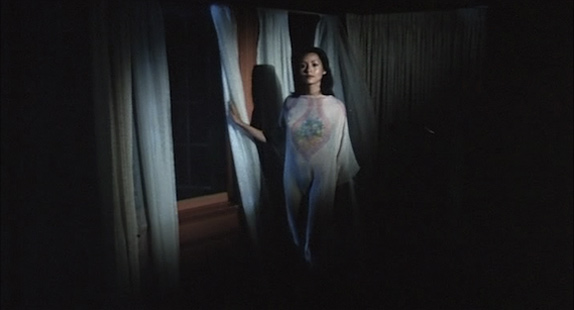
Embryo certainly offers a rather somber, alarmist view of genetic tinkering; its notion of growing a miscarried foetus, then to have sex with it — and impregnate it — is all kinds of fucked-up only made less unpleasant by the levity afforded by the film’s generally ludicrous, heavy-handed execution. Carrera’s development into a scheming killer in the third act is hard to take seriously, and scenes like the house party where she is propositioned by a sleazy doctor (“We’re going to enjoy a rousingly good hump”) and causes Roddy McDowall to flip out over a chess game invite laughter more than anything.
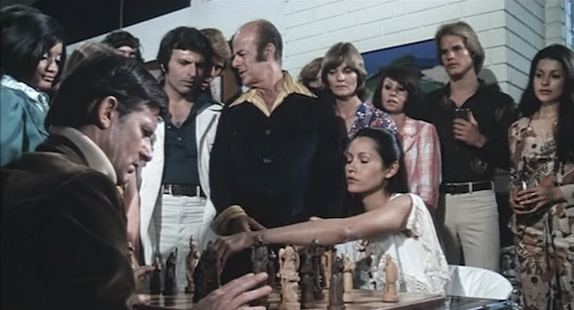
Not something I’d wholeheartedly recommend anyone, but if you know what you’re in for, Embryo should hit that spot as a reminder of how deranged ‘70s cinema could get.
THE MAGIC TOYSHOP

The dream-like, subversive fairy tales of late British fantasist Angela Carter are so rich in cinematic possibility, it’s a wonder why very little of her writing has made it to the big screen. Neil Jordan’s wicked 1984 adaptation of Carter’s short story The Company of Wolves — an adult re-envisioning of Little Red Riding Hood — is the best known, but there was also The Magic Toyshop (1987), a little-seen made-for-TV, theatrically released adaptation of her second novel.
It’s at heart a coming-of-age story about a girl on the brink of womanhood: when 15-year old Melanie (Caroline Milmore, who was 23) learns that her parents have been killed in an airplane crash, she, and her two younger siblings, are sent to London to live with their eccentric Uncle Philip (Tom Bell), his Irish wife Margaret and her two brothers, in their toyshop where they put on bizarre stage plays.
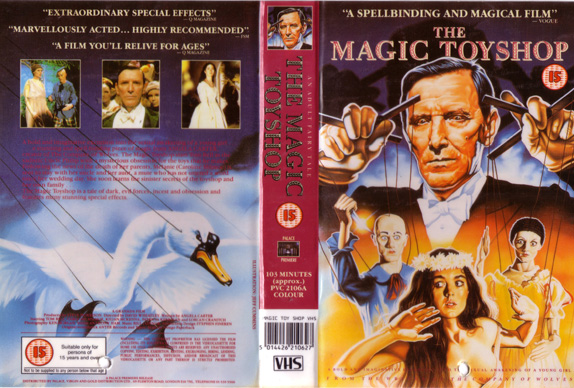
Though the film was initially intended for television broadcast, there’s nothing to suggest that any of its content has been particularly neutered for that audience in mind. Carter, as on The Company of Wolves, was heavily involved during the adaptation process, and her fervent, provocative imagination remains intact enough that it ensures that the film’s subtler moments are even tinged with sharply Freudian perversity.
From Milmore’s early full-frontal nude appearance where she regards herself in the mirror (“Physically I’ve reached my peak; from now on I can only deteriorate”), to Bell’s perfectly repellent performance as the taciturn surrogate father (“Do you get periods?” he asks with the disturbingly insinuating cadence of a serial killer), The Magic Toyshop doesn’t lack for creepy nor malevolent vibes. Add to that some Švankmajer-esque stop-motion animation, druggy dream sequences, a dose of incest and a gaggle of dead-eyed marionettes, and you’ve got yourself a fairly dodgy “family flick” that straddles the line between child-like enchantment and nightmarish unease.
WHITE LINE FEVER

The trucking movie is a genre that probably won’t enjoy any kind of revival anytime soon; though the last couple of decades have produced solid entries like Breakdown and Joyride, the genre arguably hit its peak in the ‘70s with the release of films like Convoy, Smokey and the Bandit and Every Which Way But Loose, all of which rode on the wave of CB radio’s popularity.
Jonathan Kaplan’s White Line Fever (1975) is one of the best, a tough, gritty, honest-to-goodness B-picture starring Jan-Michael Vincent as Carrol Jo Hummer, an air force veteran returning home to start a new life with his wife (Kay Lenz) and hoping to get into the business of independent trucking. Unfortunately the scene’s been corrupted by unseemly fellows like contraband smuggler L.Q. Jones and corporate asshat Don Porter, who aren’t making it easy for him to make a living without breaking the law.
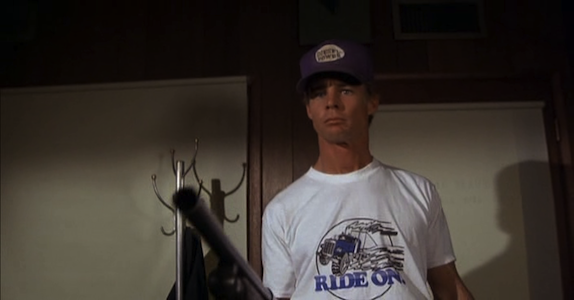
Stuffed with terrific character actors (Slim Pickens, Dick Miller, R.G. Armstrong!), and aided by pacey, unfussy direction from Corman factory graduate Kaplan (Over The Edge), White Line Fever delivers some fine drive-in thrills from its time-tested decent-man-pushed-t0-breaking-point premise. Vincent has never been an actor of much range, but he’s likeable, and possesses a boy-scout-ishness ideal for the role. The final stunt where Vincent rams his truck through the logo of Porter’s energy company — conveniently propped up on a mound of dirt — is a totally satisfying piece of slow-mo vehicular destruction.



















